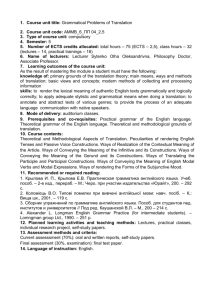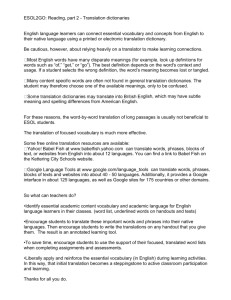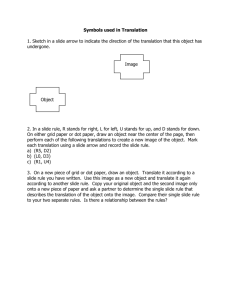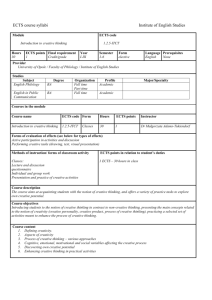Instytutowy Pakiet ECTS 2012/13 - Institute of English, Opole
advertisement
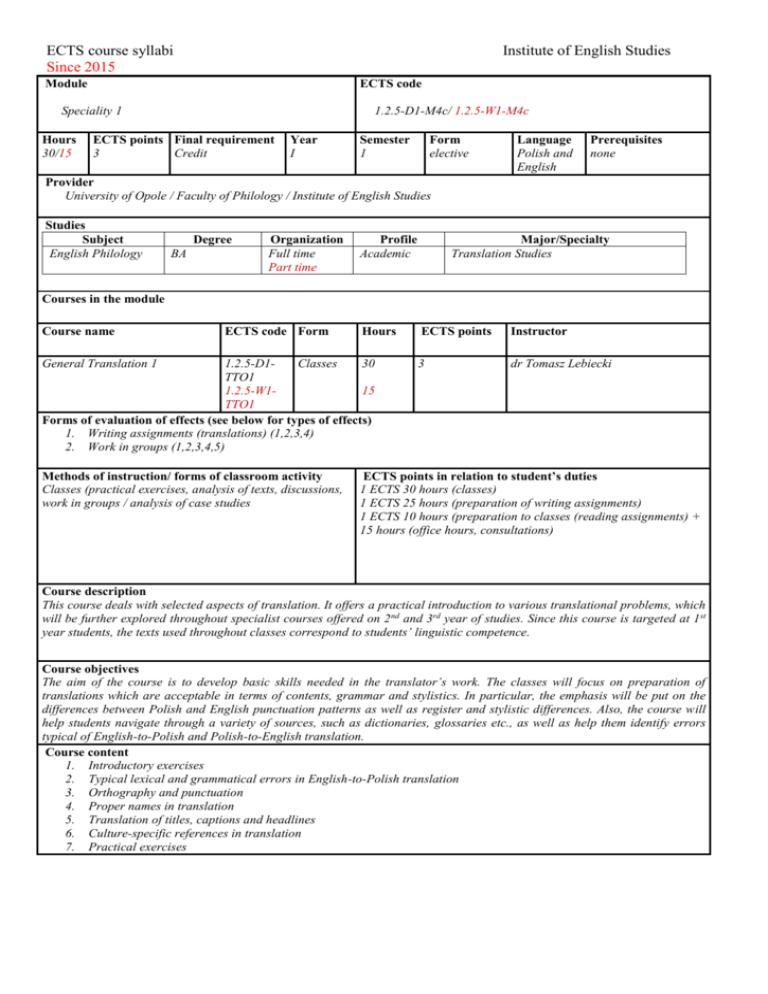
ECTS course syllabi Since 2015 Institute of English Studies Module ECTS code Speciality 1 Hours 30/15 1.2.5-D1-M4c/ 1.2.5-W1-M4c ECTS points Final requirement 3 Credit Year I Semester 1 Form elective Language Polish and English Prerequisites none Provider University of Opole / Faculty of Philology / Institute of English Studies Studies Subject English Philology Degree BA Organization Full time Part time Profile Academic Major/Specialty Translation Studies Courses in the module Course name ECTS code Form General Translation 1 Hours 1.2.5-D1Classes 30 TTO1 1.2.5-W115 TTO1 Forms of evaluation of effects (see below for types of effects) 1. Writing assignments (translations) (1,2,3,4) 2. Work in groups (1,2,3,4,5) Methods of instruction/ forms of classroom activity Classes (practical exercises, analysis of texts, discussions, work in groups / analysis of case studies ECTS points Instructor 3 dr Tomasz Lebiecki ECTS points in relation to student’s duties 1 ECTS 30 hours (classes) 1 ECTS 25 hours (preparation of writing assignments) 1 ECTS 10 hours (preparation to classes (reading assignments) + 15 hours (office hours, consultations) Course description This course deals with selected aspects of translation. It offers a practical introduction to various translational problems, which will be further explored throughout specialist courses offered on 2 nd and 3rd year of studies. Since this course is targeted at 1 st year students, the texts used throughout classes correspond to students’ linguistic competence. Course objectives The aim of the course is to develop basic skills needed in the translator’s work. The classes will focus on preparation of translations which are acceptable in terms of contents, grammar and stylistics. In particular, the emphasis will be put on the differences between Polish and English punctuation patterns as well as register and stylistic differences. Also, the course will help students navigate through a variety of sources, such as dictionaries, glossaries etc., as well as help them identify errors typical of English-to-Polish and Polish-to-English translation. Course content 1. Introductory exercises 2. Typical lexical and grammatical errors in English-to-Polish translation 3. Orthography and punctuation 4. Proper names in translation 5. Translation of titles, captions and headlines 6. Culture-specific references in translation 7. Practical exercises Reading list A. obligatory reading (to get a credit): A.1. used in class Belczyk, A. (2004). Poradnik tłumacza z angielskiego na nasze. Kraków: Wydawnictwo Idea. Douglas-Kozłowska Ch. (2005). Difficult Words in Polish-English Translation. Warszawa: PWN. A.2. used for self-study Hejwowski K. (2002). Komunikacyjno-kognitywna teoria przekładu. Warszawa: PWN. B. supplementary reading Korzeniowska, A. (1998). Explorations in Polish-English Mistranslation Problems. Warszawa: Wydawnictwa Uniwersytetu Warszawskiego. Effects Knowledge 1. Students know basic terminology on translation (K_W04) 2. Students have basic knowledge on the role and importance of translation in social and economic life (K_W04) Skills 3. Students can use basic theoretical concepts found in Translation Studies (K_U 04) 4. Students have linguistic competence adequate to navigate through discourse of Translation Studies (K_U 05) Social competences 5. Students can co-operate and work in a team where they can fulfill different roles (K_K04). Contact dr Tomasz Lebiecki: tomaszlebiecki@uni.opole.pl

